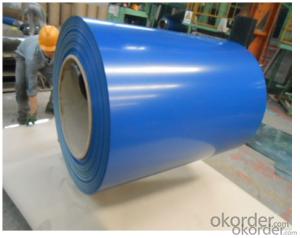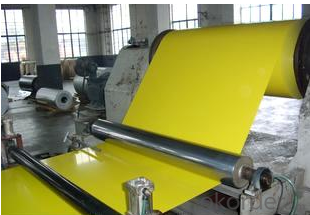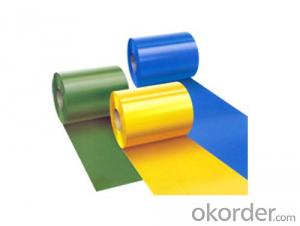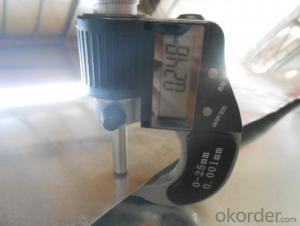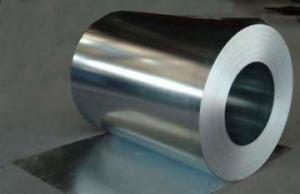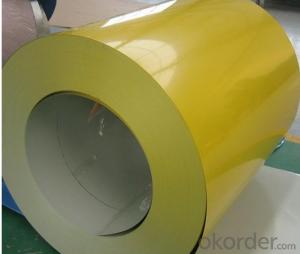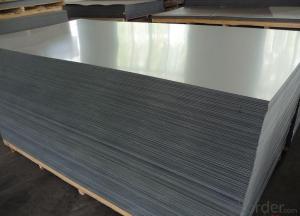Best Quality of Color Cotated Gavalnized Steel Sheet/Coil in High Quality
- Loading Port:
- Shanghai
- Payment Terms:
- TT OR LC
- Min Order Qty:
- 100 m.t.
- Supply Capability:
- 10000 m.t./month
OKorder Service Pledge
OKorder Financial Service
You Might Also Like
1. Pre-Painted Galvanized/Aluzinc Steel Coil Description:
With GI as base material, after pretreatment (degrease and chemical treatment ) and liquid dope with several layers of color, then after firing and cooling, finally the plate steel is called pre-painted galvanized (aluzinc) steel. Pre-painted galvanized steel is good capable of decoration, molding, corrosion resistance. It generally displays superior workability, durability and weather resistance.
2.Main Features of the Pre-Painted Galvanized/Aluzinc Steel Coil:
• Excellent process capability
• Smooth and flat surface
• Workability, durability
• Excellent heat resistance performance
• High strength
• Good formability
• Good visual effect
3.Pre-Painted Galvanized/Aluzinc Steel Coil Images
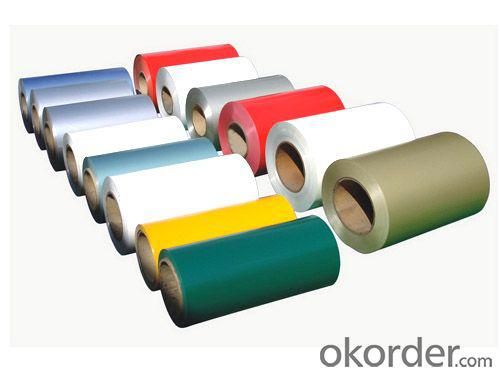
4.Pre-Painted Galvanized/Aluzinc Steel Coil Specification
Standard: AISI, ASTM, BS, DIN, GB, JIS
Grade: DX51D, DX52D
Thickness: 0.17-2.0mm
Brand Name: KMRLON
Model Number: coil
Type: Steel Coil
Technique: Cold Rolled
Surface Treatment: Coated
Application: Boiler Plate
Special Use: High-strength Steel Plate
Width: 20-1250mm
Length: customized
commoidty: pre-painted galvanized steel coil
Thickness: 0.13-4.0mm
width: 20-1250mm
zinc coating: 40-180g/m2
printing thickness: top side: 20+/-5 microns, back side: 5-7 microns
color: all RAL color
surface treatment: color coated
coil weight: 4-7 tons
coil ID: 508/610mm
packaging: standard seaworthy packing
5.FAQ of Pre-Painted Galvanized/Aluzinc Steel Coil
1. What’s the application of this product?
Roof, roof structure, surface sheet of balcony, frame of window, etc.
2. What’s the brand of the paint?
We use the best brand of all of the word—AKZO.
3. How about your company?
A world class manufacturer & supplier of castings forging in carbon steel and alloy steel,is one of the large-scale professional investment casting production bases in China,consisting of both casting foundry forging and machining factory. Annually more than 8000 tons Precision casting and forging parts are exported to markets in Europe,America and Japan. OEM casting and forging service available according to customer’s requirements.
4. How to guarantee the quality of the products?
We have established the international advanced quality management system,every link from raw material to final product we have strict quality test;We resolutely put an end to unqualified products flowing into the market. At the same time, we will provide necessary follow-up service assurance.
5. How long can we receive the product after purchase?
Usually within thirty working days after receiving buyer’s advance payment or LC. We will arrange the factory manufacturing as soon as possible. The cargo readiness usually takes 15-25 days, but the shipment will depend on the vessel situation.
- Q: I need to identify a metal. It is rusty so I suspect it is either iron or steel. Since they both have similar densities and are magnetic, how do I tell the difference betweeen steel and iron?
- Iron is a natural ore. Google: Iron ore, click on Mineral Information Institute - Iron Ore. Steel is a man-made material, consisting of iron. Google: Sir Henry Bessemer, inventor.
- Q: What are the factors affecting the lifespan of steel coils?
- There are several factors that can affect the lifespan of steel coils. Firstly, the quality of the steel used in the manufacturing of the coils plays a significant role. High-quality steel with proper composition and metallurgical properties tends to have a longer lifespan compared to lower-quality steel. Secondly, the environment in which the steel coils are stored and used also affects their lifespan. Exposure to extreme temperatures, humidity, and corrosive substances can lead to degradation and corrosion of the coils, reducing their lifespan. Proper storage conditions, such as controlled temperature and humidity levels, can help prolong the lifespan of the coils. Thirdly, the handling and transportation of steel coils can impact their lifespan. Improper handling, such as dropping or mishandling during loading and unloading, can cause physical damage to the coils, leading to premature failure. Similarly, rough transportation conditions, such as excessive vibration or impact, can also contribute to the deterioration of the coils and reduce their lifespan. Furthermore, the maintenance and care of the steel coils also play a role in their lifespan. Regular inspection, cleaning, and maintenance can help identify and address any potential issues before they become major problems. Additionally, applying protective coatings or treatments to the coils can help prevent corrosion and extend their lifespan. Overall, a combination of factors including the quality of the steel, storage conditions, handling and transportation, and maintenance practices all contribute to the lifespan of steel coils. It is essential to consider these factors and take appropriate measures to ensure the longevity of the coils.
- Q: How are steel coils coated?
- Steel coils are typically coated through a process known as coil coating, which involves applying a protective layer to the surface of the steel. This is done by passing the coil through a series of rollers that apply the coating material evenly across the entire surface. The coating can be applied using various methods such as roll coating, spray coating, or electrostatic coating, depending on the desired finish and properties. The coated steel coils are then cured or baked to ensure the coating adheres properly and provides the desired level of protection and durability.
- Q: How are steel coils used in the manufacturing of agricultural sprayers?
- Steel coils are used in the manufacturing of agricultural sprayers as they are shaped and formed into the structure of the sprayer, providing strength, durability, and stability. The coils are often used as the main frame or structural components of the sprayers, ensuring that they can withstand the harsh conditions and heavy loads involved in agricultural applications.
- Q: What are the common industry standards for steel coils?
- The common industry standards for steel coils vary depending on the region and specific application. However, there are several widely recognized standards that are commonly used in the steel industry. One of the most commonly referenced standards for steel coils is the American Society for Testing and Materials (ASTM) standard. ASTM has developed a wide range of specifications for different types of steel coils, such as hot-rolled, cold-rolled, and galvanized coils. These specifications outline various mechanical and chemical properties that the steel must meet, as well as dimensions, tolerances, and testing requirements. In addition to ASTM, other international organizations such as the International Organization for Standardization (ISO) and the European Committee for Standardization (EN) have also established standards for steel coils. ISO standards, such as ISO 3574 and ISO 5952, provide guidelines for the general requirements, dimensional tolerances, and mechanical properties of steel coils. Similarly, EN standards, such as EN 10130 and EN 10131, specify the characteristics and tolerances for cold-rolled steel coils. Furthermore, industry-specific organizations and associations may have their own standards for steel coils. For example, the American Iron and Steel Institute (AISI) has developed specific standards for different types of steel products, including coils. These standards cover various aspects such as chemical composition, mechanical properties, and surface finish. It is important to note that steel coil standards can also be determined by the end-use application. Industries such as automotive, construction, and manufacturing may have specific requirements that go beyond the general standards. In such cases, customers and manufacturers may refer to industry-specific standards or work together to define custom specifications. Overall, while there are several common industry standards for steel coils, it is crucial to consult the specific standards and requirements applicable to the region and application in question to ensure compliance and quality.
- Q: What are the dimensions of steel coils used in the energy sector?
- The dimensions of steel coils used in the energy sector can vary depending on the specific application and requirements. However, commonly used dimensions for steel coils in the energy sector range from 0.5mm to 5.0mm in thickness, with widths typically ranging from 600mm to 2000mm. The diameter of the coil can vary as well, with commonly used sizes ranging from 1000mm to 2200mm. These dimensions are chosen to ensure the coils can be easily transported, processed, and utilized in various energy sector applications such as power plants, oil and gas pipelines, and renewable energy projects. It is important to note that these dimensions are not fixed and can be customized based on specific project requirements.
- Q: What are the environmental impacts of producing steel coils?
- The production of steel coils has numerous environmental effects. Firstly, it entails the extraction of iron ore, which necessitates mining activities. These mining operations can result in deforestation, habitat destruction, and soil erosion. Furthermore, considerable amounts of energy are required for the extraction and processing of iron ore, contributing to greenhouse gas emissions and air pollution. Moreover, the production of steel coils involves various stages, including smelting and refining, which are energy-intensive and release significant quantities of carbon dioxide, sulfur dioxide, and nitrogen oxides. These emissions contribute to air pollution, acid rain, and climate change. Water consumption is also a noteworthy environmental impact. Steel production necessitates substantial volumes of water for cooling and processing purposes. This high demand for water can strain local water resources and potentially lead to water scarcity or pollution if not managed properly. Furthermore, the steel industry generates substantial quantities of waste and by-products, such as slag, dust, and sludge. Proper disposal and treatment of these waste materials are crucial to prevent soil and water contamination. Lastly, transportation plays a role in the environmental impact of steel coil production. The transportation of raw materials and finished products can result in carbon emissions and air pollution, particularly for long distances. To mitigate these environmental impacts, various measures can be implemented. Adopting more efficient production processes, such as recycling and utilizing renewable energy sources, can reduce energy consumption and emissions. Additionally, enhancing waste management practices, investing in water conservation technologies, and optimizing transportation logistics can help minimize the environmental footprint of steel coil production.
- Q: How are steel coils tested for compliance with industry standards?
- Steel coils are tested for compliance with industry standards through various methods. These include visual inspection, dimensional measurements, and mechanical tests such as tensile and impact tests. Additionally, chemical composition analysis is performed to ensure that the steel meets the required specifications. These comprehensive tests ensure that the steel coils are of high quality and meet the standards set by the industry.
- Q: Are steel coils used in automotive manufacturing?
- Yes, steel coils are commonly used in automotive manufacturing. They are used to produce various components such as body panels, chassis parts, and suspension components. The high tensile strength and durability of steel make it an ideal material for creating safe and robust automobiles.
- Q: i bought an airsoft gun and it said steel recievers on it im not sure what that is
- It means the receivers are steel, what did you think it meant? I would call steel a bad thing in airsoft, because it's unnecessary and heavy. You'd honestly be better off getting a gun with plastic receivers and buying an aftermarket kit. My GP receivers are very strong, and incredibly light.
Send your message to us
Best Quality of Color Cotated Gavalnized Steel Sheet/Coil in High Quality
- Loading Port:
- Shanghai
- Payment Terms:
- TT OR LC
- Min Order Qty:
- 100 m.t.
- Supply Capability:
- 10000 m.t./month
OKorder Service Pledge
OKorder Financial Service
Similar products
Hot products
Hot Searches
Related keywords
